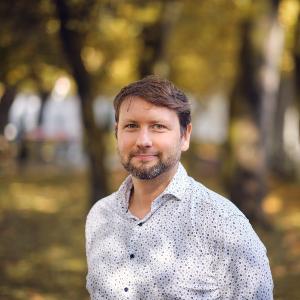Studying how democracies keep going
3 Nov 2023
Political scientist Alexander Wuttke investigates what threatens liberal societies and what strengthens them. To capture citizens’ perspective, he also uses digital data and AI.
3 Nov 2023
Political scientist Alexander Wuttke investigates what threatens liberal societies and what strengthens them. To capture citizens’ perspective, he also uses digital data and AI.

also uses artificial intelligence for his research into political behaviour. | © LC Productions
Why do people vote for individuals or parties who undermine their rights? This is one of the questions that preoccupy Alexander Wuttke. The native of Dortmund is Professor for Digitalization and Political Behavior at LMU’s Geschwister Scholl Institute of Political Science (GSI) since October 2022. Here, he studies whether people are turning their backs on politics and what they think of politicians.
“People are not tired of the idea of democracy,” Wuttke says. “It is as popular as it has always been. Around the world, almost everyone agrees on democracy as a social model. But controversy surrounds the way it is lived out. There is resignation; and there are elites that stoke up this mood and believe they can win elections by joining in with criticism of the system.”
It opened my eyes to see that we have to question traditions and convictions, and that it is possible to know for sure the answers to questions that can be of practical relevance.Alexander Wuttke
Alexander Wuttke comes from a family with relatively little education. He started out by studying economics – with little success, as he freely admits: “Abandoning that course was one of the best decisions in my life.” The reason? Essentially, the change of subject that followed: Wuttke switched to politics and social science. Things moved quickly from then on: “The subject matter fascinated me. And I discovered that if you are interested in what you learn and see it as important, you are better at what you do.”
For him, an experience that affected his personal political commitments marked a decisive point in his academic career. He was canvassing for votes at an information booth when he learned of a scientific study questioning whether this was a sensible way to go about winning over potential voters. “It showed me that there are scientists who study this matter, and that there are also convincing experimental methods. In the case in point, they found out that going from door to door would be more efficient. It opened my eyes to see that we have to question traditions and convictions, and that it is possible to know for sure the answers to questions that can be of practical relevance.”
Wuttke completed his bachelor’s degree at the Ruhr University Bochum (RUB) and his master’s degree at the University of Bamberg. He studied for his doctorate at the Mannheim Center for European Social Research (MZES) at the University of Mannheim. “A stroke of luck,” as he says, looking back, because this move opened up all kinds of doors. The reputation of the university, where he also applied himself to survey methods, made it possible for him to study abroad in Montreal and Aarhus, for example. In 2020, he earned his doctorate with a thesis on why some people engage in political life and others do not. As a postdoctoral researcher, he stayed in Mannheim while also conducting research at the University of Oslo as part of the project “When will citizens defend democracy?”
In Germany, LMU is one of the central hubs of AI research. It is unique in that basic research is done here, while there are also academics like myself who apply AI in their research.Alexander Wuttke
Wuttke has a finger on the pulse of current events with his research topics, but he is also looking into new methodological developments. For example, he complements traditional survey questionnaires by adding in digital data and exploring the use of artificial intelligence (AI). To this end, he is currently working with colleagues from the statistics and computer linguistics departments. “AI opens up completely new possibilities to resolve the familiar trade-off between quantitative and qualitative surveys.”
"In Germany, LMU is one of the central hubs of AI research. It is unique in that basic research is done here, while there are also academics like myself who apply AI in their research.” Wuttke recalls an interdisciplinary meeting on artificial intelligence attended by 50 LMU professors. He is very excited about the extensive interdisciplinary network and the synergies to which this gives rise, and which he sees as a “fantastic opportunity”.
What motivates the professor is the desire “to do something on the scientific and analytical front to strengthen democracy. We take democracy for granted, like we do with electricity out of the wall. But the successes of politicians such as Trump and Orban show precisely that it cannot be taken for granted.” LMU is the right place for research to contribute to this issue, he believes. “After the Second World War, political science took root in Germany with the aim of providing scientific support for democracy. I see myself in the same tradition with my research. It has a good home at the Geschwister Scholl Institute, which literally carries its mission in its name.”
Alexander Wuttke: Website and publications